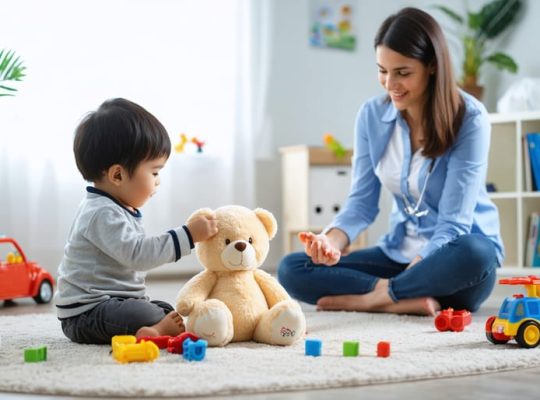Families serve as the cornerstone of child development, shaping mental health and emotional well-being through five essential functions that create a healthy family dynamic. These fundamental roles – providing emotional security, fostering social development, ensuring physical care, supporting educational growth, and instilling values – work together like instruments in an orchestra, each playing a crucial part in your child’s developmental symphony.
Understanding how these functions operate within your family unit isn’t just theoretical; it’s a practical framework for strengthening relationships and promoting mental wellness. Whether you’re navigating daily challenges or seeking ways to enhance your family’s emotional connections, recognizing these core functions helps identify areas for growth and celebration.
As parents, educators, and healthcare professionals increasingly recognize the impact of family dynamics on children’s mental health, exploring these five functions provides a roadmap for creating nurturing environments where children can thrive. By examining each function through the lens of family therapy, we unlock powerful tools for supporting children’s emotional development and building resilient family relationships.
Let’s explore how these essential family functions shape children’s well-being and discover practical strategies for strengthening each one in your daily life.

The Emotional Support Function: Building a Safe Haven
Creating Emotional Safety
Creating a safe emotional environment is fundamental to healthy family functioning. When family members feel secure enough to express their feelings openly, they build stronger bonds and develop better coping mechanisms. Family therapy provides various therapeutic tools for emotional support that help establish this crucial safety net.
Dr. Sarah Chen, a family therapist with 15 years of experience, explains, “When children feel emotionally safe at home, they’re more likely to share their struggles, seek help when needed, and develop resilience.” This safety develops through consistent validation of feelings, active listening, and appropriate responses to emotional needs.
Family therapy helps achieve this by teaching parents to recognize and respond to emotional cues, establish predictable routines, and create spaces for open dialogue. Simple practices like regular family check-ins, expressing appreciation, and acknowledging difficult emotions can transform the family dynamic. When parents model emotional awareness and healthy expression, children learn to trust their feelings and develop stronger emotional intelligence.
Developing Healthy Attachment
Healthy attachment forms the foundation of a child’s emotional well-being and shapes their future relationships. When parents consistently respond to their children’s needs with warmth and understanding, they create a secure base from which children can confidently explore the world.
Dr. Sarah Chen, a child psychologist, explains, “Think of secure attachment as an invisible safety net. When children know they can count on their caregivers, they develop the confidence to face challenges and regulate their emotions effectively.”
Parents can foster healthy attachment through simple daily interactions. Making eye contact during conversations, responding promptly to distress signals, and offering comfort during difficult moments all contribute to building strong emotional bonds. Even busy parents can create meaningful connections through quality moments like bedtime routines or shared meals.
Research shows that children with secure attachment patterns typically show better social skills, higher self-esteem, and greater emotional resilience. They’re also more likely to form healthy relationships in adulthood and maintain good mental health.
Remember that it’s never too late to improve attachment patterns. Small, consistent efforts to show up emotionally for your child can make a significant difference in their development and well-being.
The Socialization Function: Teaching Life Skills
Building Social Competence
Families serve as the first and most influential social learning environment for children. Through daily interactions, parents and siblings help children develop crucial social skills, emotional intelligence, and behavioral awareness. Family therapy strengthens these learning opportunities by creating structured environments where children can practice social skills in a safe, supportive setting.
Therapists often incorporate play therapy techniques and role-playing exercises to help family members improve their communication and interaction patterns. These activities allow children to learn important social skills like sharing, taking turns, expressing emotions appropriately, and resolving conflicts peacefully.
Parents also receive guidance on modeling positive social behaviors and creating opportunities for their children to practice these skills in real-world situations. This might include organizing family game nights, encouraging participation in group activities, or facilitating supervised playdates. Through consistent practice and positive reinforcement, children develop the confidence and competence needed to navigate social relationships both within and outside the family unit.
The ultimate goal is to help children build lasting social skills that will serve them throughout their lives, from maintaining friendships to succeeding in school and future workplace environments.
Emotional Intelligence Growth
Emotional intelligence within the family setting serves as a cornerstone for healthy development and lasting relationships. When families actively nurture emotional awareness, children learn to identify, understand, and manage their feelings effectively. Parents can model this by openly discussing emotions and validating their children’s experiences, creating a safe space for emotional expression.
Dr. Sarah Thompson, a family therapist with 20 years of experience, shares: “When parents respond to their children’s emotions with empathy and understanding, they’re essentially teaching emotional literacy. It’s like building an emotional vocabulary that will serve them throughout their lives.”
Simple practices like naming emotions during daily activities, discussing feelings during family meetings, and acknowledging both positive and challenging emotions help build this essential skill. Families can create “emotion check-ins” during dinner time or before bedtime, allowing everyone to share their feelings and experiences.
Remember that emotional regulation isn’t about suppressing feelings but learning to process them healthily. When families work together to understand and manage emotions, they create a supportive environment where everyone feels heard and valued, leading to stronger mental health outcomes for all family members.
The Protection Function: Creating Boundaries
Physical and Emotional Protection
One of the most fundamental roles of a family is to create a safe haven where members feel protected both physically and emotionally. This protective environment starts with ensuring basic safety needs, such as shelter, security, and protection from harm. Parents and caregivers act as guardians, creating boundaries and establishing rules that keep children safe while allowing appropriate independence as they grow.
Emotional protection is equally crucial and involves creating an atmosphere where family members feel secure expressing their feelings without fear of judgment or rejection. This includes validating emotions, offering comfort during difficult times, and providing a consistent source of support. When children know they have a safe emotional base to return to, they develop greater resilience and confidence in exploring the world around them.
Healthy families establish clear communication channels, allowing members to voice concerns and seek help when needed. They also develop strategies to handle conflicts constructively and protect each other from external pressures and threats. This might involve standing up against bullying, advocating for each other’s needs, or simply being there to listen after a challenging day.
Building this protective environment requires ongoing effort and adaptation as family members grow and circumstances change. Regular family meetings, open discussions about safety, and maintaining strong emotional bonds all contribute to this vital family function.
Healthy Boundary Setting
Setting healthy boundaries within families is a cornerstone of emotional well-being and an essential component of any mental health toolkit. In family therapy, we work together to establish clear, respectful boundaries that honor each family member’s needs while maintaining strong connections.
Think of boundaries like invisible fences that protect our emotional space. They help children feel secure while learning independence, and they give parents the structure needed to maintain consistent, loving relationships. Through guided exercises and open dialogue, families learn to communicate their limits effectively and respect others’ boundaries.
Dr. Sarah Chen, a family therapist with 15 years of experience, shares: “When families establish healthy boundaries, children develop stronger self-esteem and better relationship skills. They learn it’s okay to say ‘no’ and to respect when others do the same.”
Some key boundary-setting practices include: expressing feelings without blame, acknowledging personal space, respecting privacy, and maintaining age-appropriate expectations. Remember, boundaries aren’t walls – they’re bridges that help us connect more meaningfully while preserving our individual identities.

The Education Function: Supporting Growth
Academic Support
Academic support within the family plays a crucial role in a child’s educational journey and overall development. When families actively engage in their children’s learning, they create an environment that nurtures intellectual growth and academic success. This support can take many forms, from helping with homework and attending parent-teacher conferences to simply showing interest in what children learn at school.
Parents who establish consistent study routines and create dedicated learning spaces at home help their children develop strong academic habits. Even more important is the emotional encouragement families provide, celebrating achievements and offering comfort during challenging times. This emotional backing helps children build confidence in their academic abilities and develop resilience when facing educational obstacles.
Successful academic support also involves maintaining open communication with teachers and school staff, ensuring that children receive consistent guidance both at home and in school. Families can enhance learning by incorporating educational activities into daily life, such as reading together, discussing current events, or exploring nature – turning everyday moments into valuable learning experiences.
This educational support function extends beyond formal schooling, encompassing the development of life skills, critical thinking, and a genuine love for learning that will serve children throughout their lives.
Life Skills Education
Life skills education within the family setting plays a vital role in preparing children for life’s challenges and fostering mental resilience. Parents serve as primary teachers, guiding their children through essential everyday skills that contribute to emotional well-being and personal growth.
This educational function includes teaching practical skills like problem-solving, decision-making, and emotional regulation. Through daily interactions, parents model and teach children how to manage stress, communicate effectively, and develop healthy coping mechanisms. For example, when a child faces a difficult homework assignment, parents can guide them through breaking down the task into manageable steps, teaching both practical study skills and emotional persistence.
Family therapist Dr. Sarah Chen notes, “When families actively engage in teaching life skills, children develop greater confidence and adaptability. These qualities become crucial protective factors for mental health throughout their lives.”
Simple activities like involving children in household planning, budgeting, or conflict resolution discussions provide natural opportunities for learning. These teaching moments help children develop independence while maintaining the supportive family connection that’s essential for their emotional development and overall well-being.
The Identity Function: Fostering Self-Worth
Building Self-Esteem
A supportive family environment plays a crucial role in building and maintaining healthy self-esteem in children. When families actively celebrate each member’s achievements, acknowledge their unique qualities, and provide consistent emotional support, children develop a strong sense of self-worth that carries into adulthood.
Parents can foster positive self-image by offering specific, genuine praise focused on effort rather than outcomes. For example, instead of simply saying “good job,” try “I noticed how hard you worked on solving that math problem.” This approach helps children understand their value isn’t tied solely to achievements but to their character and determination.
Family activities that highlight individual strengths while promoting cooperation can significantly boost self-esteem. Regular family meetings where everyone’s opinions are valued, shared hobbies that allow each member to contribute their unique skills, and creating opportunities for age-appropriate responsibilities all contribute to a child’s growing sense of capability and worth.
It’s equally important to create a safe space where mistakes are viewed as learning opportunities rather than failures. When families embrace this mindset, children feel more confident taking risks and developing resilience, essential components of healthy self-esteem.

Cultural and Personal Identity
Families play a crucial role in shaping who we become by providing the foundation for both cultural and personal identity development. Through shared experiences, traditions, and values, family members help children understand their heritage and develop a strong sense of self.
When parents share family stories, celebrate cultural traditions, and maintain connections with extended family members, they create a rich tapestry of identity for their children. These experiences help young people understand where they come from and who they are, building confidence and resilience that supports their mental well-being.
Family rituals, whether they’re weekly dinner conversations or annual holiday celebrations, strengthen cultural bonds and create lasting memories that contribute to a child’s sense of belonging. Even simple daily interactions, like discussing family history or sharing cultural foods, help children develop pride in their heritage and understand their place within both their family and broader community.
For multicultural families, this function becomes especially important as children learn to navigate and embrace multiple cultural identities. Parents who actively support their children’s cultural exploration while maintaining family connections help build strong, confident individuals who can celebrate all aspects of their identity.
Family functions play a vital role in supporting mental health and fostering emotional well-being for every family member. Through therapy, these essential functions can be strengthened, helping families build stronger connections and overcome challenges together. When families actively work on improving their emotional support, communication, boundaries, and ability to adapt, they create a nurturing environment where children can thrive and develop healthy coping mechanisms.
Remember that every family is unique, and there’s no one-size-fits-all approach to enhancing these functions. What matters most is the commitment to growth and understanding. By recognizing and nurturing these five core family functions, parents and caregivers can create a solid foundation for their children’s mental health and build lasting, meaningful relationships that support everyone’s well-being. Whether through professional guidance or personal effort, investing in these family functions is an investment in your family’s future happiness and resilience.







